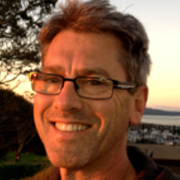
Andrew Hawthorn
Andrew Hawthorn has produced and directed sports events right across on the globe — including co-ordinating coverage of America's Cup and Volvo Ocean Races, international rugby league and the Commonwealth and Olympic Games.
Hawthorn was introduced to television at an early age. At 13, he found himself on location in central Otago, having won the lead role in Hunter’s Gold, the most expensive TV production made in New Zealand up until that date. Hawthorn played Scott Hunter, searching for his missing father amongst the goldfields of 1860s-era NZ.
Filming in the valleys behind Queenstown, Hawthorn had little idea how groundbreaking this early kidult drama was. The cast were ferried to location each day as part of a fleet of landcruisers, where he found himself caught up in bullock trains, chase scenes, gunfights, and chase scenes. One night the stream they were filming beside froze solid, and the crew turned off the power, “so we could watch the Aurora Australis play in the sky”.
Hunter’s Gold marked Hawthorn's first and last sizable role in front of the camera. But the experience gifted Hawthorn with the broadcasting bug. Later, while studying science at Auckland University, he had a small role in period drama Hanlon, and enjoyed four years DJing at uni station Radio B (now 95bFM).
After a year hosting the graveyard shift on The Rock and Triple MMM, Hawthorn switched mediums, and joined Television New Zealand in 1985. Juggling live images and film would be the common feature of this part of his career. Hawthorn was soon working as a vision mixer and editor on a wide range of material, from news to comedy.
Hawthorn mixed images during the studio components of the 1990 Commonwealth Games, and in 1992 he began accumulating experience across a wide range of sports, from tennis to golf. In the studio he was producing live show Sunday Grandstand; he was also directing live outside broadcasts of rugby league games that might involve calling the shots for up to 10 cameras.
By the time the Winter Olympics began in Norway in early 1994, Hawthorn was directing three hour-long highlights packages for each day of competition. He was also helming shorter packages for Asia, South Africa and the Middle East. In 2000 the International Olympic committee would nominate him for his host broadcast coverage of the sailing at the Sydney Games.
Hawthorn was also making a name for himself for his work on ocean-based events. In 1995 he travelled to San Diego for six months, to work on 150 hours of coverage of Black Magic's five race America's Cup victory over the Dennis Conner-helmed Stars and Stripes. Presenter John McBeth, who spent many hours presenting races on-screen with Hawthorn communicating via earpiece as his director, recalls Hawthorn’s calmness under pressure: “he was unflappable even under stress”.
Later Hawthorn helmed live coverage from the start line during three different legs of the Whitbread Round the World Yacht Race (now known as the Volvo Ocean Race). When the America's Cup first came to Auckland in 1999, Hawthorn was producer and director of the race coverage, leading a team of 120. With TVNZ as host broadcaster, the race footage was sent around the world so individual broadcasters could add their own commentary.
The coverage broke new ground in successfully operating cameras and sound equipment by remote control, via digital microwave links. Aside from cameras on competing yachts, others were mounted on helicopters and speedboats. Hawthorn shared an NZ Television Award for his part as producer and director of the coverage (award rules meant only one programme could actually be nominated, from the 100s of hours of race footage).
Hawthorn continued making his mark in yachting coverage after leaving TVNZ in 2000. Travelling often from his base in England, he was a producer and/or director during a number of big events including the Volvo Ocean Race, the Americas Cup in Valencia in 2007 and 2009, and on Brit-based magazine show Rolex Spirit of Yachting.
In 2002 Hawthorn spent time in the US, South Africa, Brazil, NZ, the UK and the US to make documentary Around Alone, named after the solo yacht race (now the Velux 5 Oceans Race). Hawthorn was often the first and last person to greet the sailors at the start and end of each leg.
Hawthorn returned to New Zealand in 2010, and began freelancing for Sky Sports. In 2013 he became a senior producer at Sky Sports, where his college rugby colleague Keith Quinn has described him as “a pleasure to work for in his quiet and methodical manner.”
Sources include
Andrew Hawthorn
John McBeth
Keith Quinn